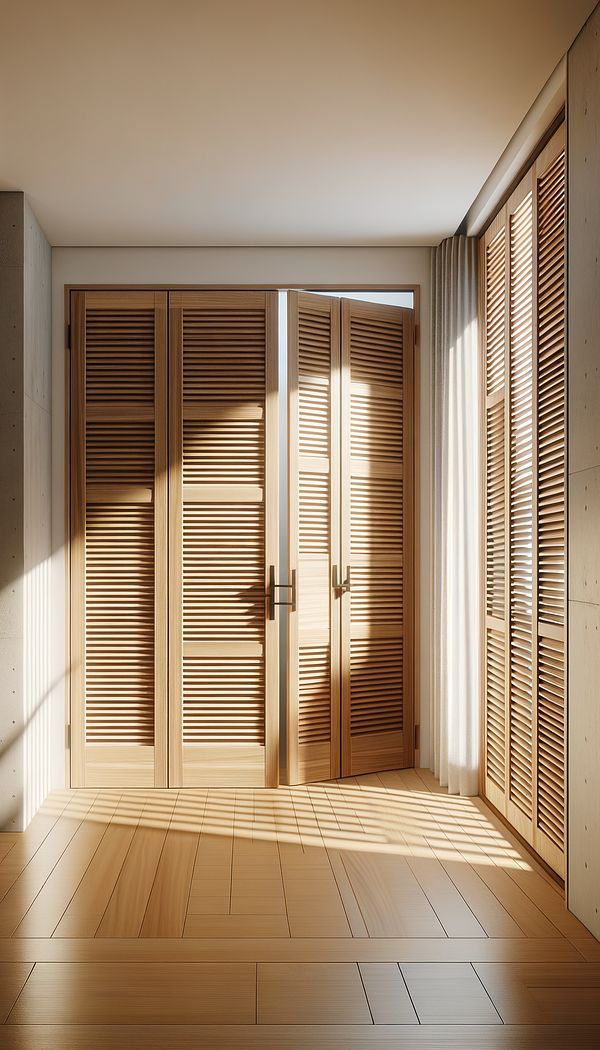What is Louvered Doors?
Louvered doors are doors featuring angled slats or strips arranged in a parallel pattern, promoting ventilation while providing privacy.
Description
Louvered doors are a distinctive type of door characterized by their angled slats or strips, which are designed to allow airflow through the door while still providing a level of privacy and light control. These slats can be fixed or adjustable, allowing for varying degrees of ventilation and visibility. Traditionally made from wood, louvered doors can also be found in metal, plastic, and other materials depending on the application and design preference.
Louvered doors are versatile and can be used in a variety of settings, including closets, laundry rooms, pantries, and as decorative room dividers. They are particularly favored in areas requiring consistent air circulation, such as in tropical climates or spaces prone to moisture, helping to prevent the buildup of mold and mildew. In addition to their practical benefits, louvered doors add an architectural element of texture and interest, making them a popular choice in both traditional and contemporary interior design.
Their design flexibility means they can be incorporated into various interior styles, from beach-inspired homes to more classical settings. When planning to use louvered doors, it's important to consider the balance between the desired aesthetic, the need for privacy, and the level of ventilation required.
Usage
Louvered doors are often used in residential settings, particularly in areas like wardrobes, pantries, and utility rooms where ventilation is important. They can also be found in commercial and public buildings, serving both functional and decorative purposes. In tropical or humid environments, louvered doors are especially valued for their ability to facilitate airflow and reduce humidity within indoor spaces.
FAQs
-
Can louvered doors be used for exterior applications?
Yes, louvered doors can be used for exterior applications, especially in climates that benefit from enhanced ventilation. They are often used as entry doors to porches, patios, or as gates in outdoor settings. However, it's crucial to choose materials suited for outdoor exposure, such as weather-resistant woods or metals.
-
Are louvered doors customizable?
Absolutely, louvered doors can be customized in terms of size, material, slat orientation, and finish. This makes them a versatile option for fitting specific design needs and personal aesthetics.
-
How do louvered doors contribute to energy efficiency?
Louvered doors can contribute to energy efficiency by promoting natural ventilation, which can reduce the need for artificial cooling. By allowing air to circulate freely, they can help maintain a comfortable indoor temperature without relying heavily on air conditioning systems.
Practical Application
When incorporating louvered doors into your space, consider the direction of airflow and privacy needs. For adjustable slats, ensure they are easily accessible for routine adjustments. Regular maintenance, such as dusting and checking for smooth operation, will keep your louvered doors looking beautiful and functioning properly. For exterior louvered doors, using materials designed to withstand weather conditions will extend their lifespan and appearance.
-
Architectural Elements199 articles
-
Design Styles478 articles
-
Window Treatments65 articles
-
Materials & Textiles360 articles
-
Bonnell CoilBonnell Coil is a type of coil used in innerspring mattresses for support.
-
Reclaimed WoodReclaimed wood is recycled wood that has been repurposed for new uses.
-
AficionadoAficionado refers to a person with a passionate interest or refined taste in a particular subject, often encompassing aspects of interior design.
-
LayeringLayering in interior design is the process of adding multiple elements together to create depth, interest, and balance within a space.
-
Pub TableA pub table is a tall, often round table typically used in pubs or bars.
